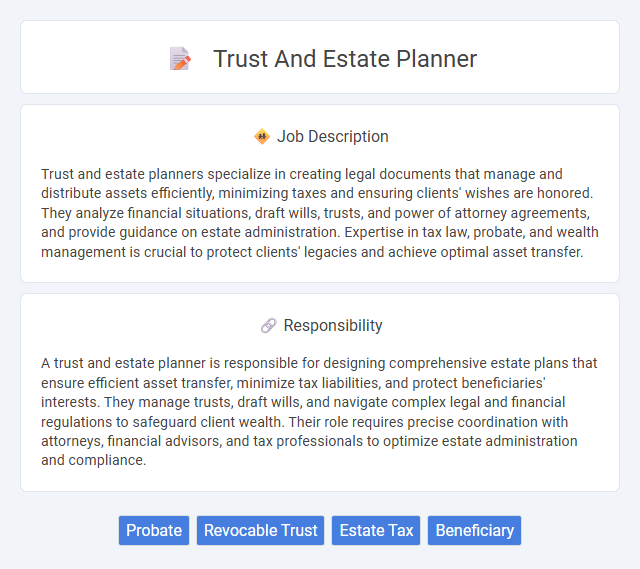
Trust and estate planners specialize in creating legal documents that manage and distribute assets efficiently, minimizing taxes and ensuring clients' wishes are honored. They analyze financial situations, draft wills, trusts, and power of attorney agreements, and provide guidance on estate administration. Expertise in tax law, probate, and wealth management is crucial to protect clients' legacies and achieve optimal asset transfer.
People with strong organizational skills and a detail-oriented mindset are likely to be well-suited for a trust and estate planner role, as this job often requires managing complex legal documents and financial instruments. Individuals who have high emotional intelligence and patience may probably excel, given the sensitive nature of working with clients on legacy and family wealth matters. Those uncomfortable with intricate legal regulations or stressful decision-making environments might find this career less compatible with their strengths and preferences.
Qualification
Trust and estate planners must possess a deep understanding of tax laws, estate planning strategies, and fiduciary responsibilities, typically requiring a law degree or certification such as Certified Trust and Fidate Advisor (CTFA). Strong analytical skills and attention to detail are essential for drafting wills, trusts, and managing estates in compliance with legal regulations. Experience in financial planning and knowledge of retirement and wealth transfer strategies further enhance their expertise in safeguarding client assets and facilitating seamless asset distribution.
Responsibility
A trust and estate planner is responsible for designing comprehensive estate plans that ensure efficient asset transfer, minimize tax liabilities, and protect beneficiaries' interests. They manage trusts, draft wills, and navigate complex legal and financial regulations to safeguard client wealth. Their role requires precise coordination with attorneys, financial advisors, and tax professionals to optimize estate administration and compliance.
Benefit
Trust and estate planners likely help clients ensure their assets are distributed according to their wishes, minimizing potential legal disputes and tax burdens. They probably provide tailored strategies that protect wealth for future generations and offer peace of mind through comprehensive estate documentation. Their expertise may increase financial security and simplify the transfer of property, benefiting both clients and heirs.
Challenge
Navigating the complexities of trust and estate planning likely presents significant challenges due to constantly evolving tax laws and varying client circumstances. Professionals in this field probably face the difficulty of balancing legal requirements with personalized financial goals, requiring meticulous attention to detail and up-to-date knowledge. The probability of encountering emotionally charged family dynamics may further complicate the planning process, demanding strong interpersonal skills alongside technical expertise.
Career Advancement
Trust and estate planners develop specialized expertise in managing and distributing assets according to clients' wishes, often requiring advanced certifications such as Certified Trust and Financial Advisor (CTFA). Career advancement typically involves progressing from associate planner roles to senior advisor or director positions within financial services firms, with opportunities to lead client portfolios and complex estate strategies. Mastery of tax laws, estate regulations, and interpersonal communication enhances prospects for leadership roles and higher compensation in this specialized legal-financial sector.
Key Terms
Probate
Trust and estate planners specialize in managing probate processes to ensure a smooth transfer of assets according to the decedent's will or state laws. They assist clients in navigating court procedures, minimizing probate delays, and reducing associated taxes and fees. Expertise in probate law and estate tax regulations is essential for effective estate planning and asset preservation.
Revocable Trust
A trust and estate planner specializes in creating and managing legal strategies to preserve and transfer wealth, with a strong focus on revocable trusts. Revocable trusts allow clients to maintain control over their assets during their lifetime while enabling seamless transfer to beneficiaries, avoiding probate and reducing estate taxes. Expertise in drafting, funding, and updating these trusts is essential for tailored estate planning that adapts to clients' changing financial situations and goals.
Estate Tax
Estate tax planning is crucial for minimizing tax liabilities on assets transferred after death, ensuring maximum preservation of wealth for beneficiaries. Trust and estate planners analyze current tax laws, exemptions, and credits to develop strategies such as irrevocable trusts, gifting techniques, and charitable donations that reduce estate tax exposure. Expertise in federal and state estate tax regulations allows planners to optimize estate structures and compliance, preventing costly tax penalties and probate delays.
Beneficiary
A trust and estate planner specializes in managing assets to ensure beneficiaries receive their inheritance according to the client's wishes. They structure trusts and wills that protect beneficiaries from probate delays and minimize tax liabilities. Effective planning guarantees beneficiaries secure financial futures while complying with legal requirements.
 kuljobs.com
kuljobs.com